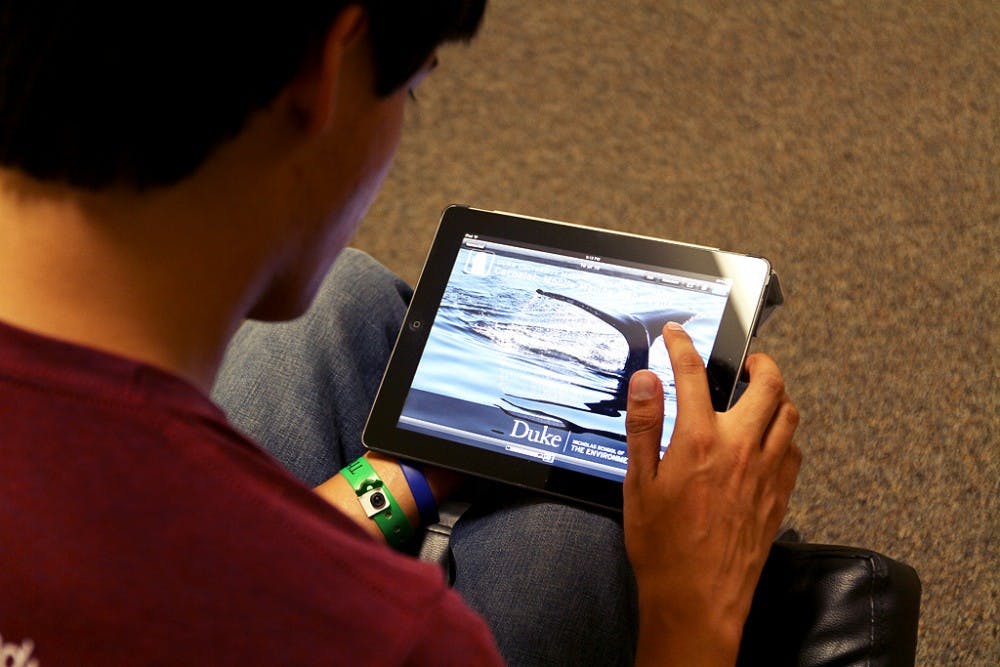Students and professors are increasingly finding new ways to incorporate technology into the classroom.
The University has adopted several online tools, such as digital textbooks, applications and online courses, to aid students in their academic endeavors. One such Apple iPad app, Cachalot, was developed by University faculty, staff and students spanning several departments for marine biology classes taught by research scientist David Johnston.
The electronic textbook integrates text, photos, videos and other digital material in a single app.
“It’s basically a scalable, open-access textbook to introduce students to marine science and conservation,” Johnston said. “It uses examples from big, beautiful, compelling ocean creatures.”
Cachalot is available as a free download for anyone—not just Duke students–and is built on an open source platform that other professors can adapt to create their own apps for their classes.
The Cachalot app, which Johnston uses for Duke’s Marine Megafauna class, is split into three sections. The first section features encyclopedic descriptions of marine mammals alongside multimedia components that help students visualize the animals. The second section includes class readings and space for annotations and highlighting. The third part includes interactive audio and video components, as well as animations.
“It’s really nice to be able to rely on multimedia to really drive home those messages,” Johnston said. “Cachalot has animations of CT scans of the animals, so we can teach things like functional anatomy really well because we can actually illustrate in 3-D space how all the bones and muscles and organs fit together.”
Sharon Chan, a junior, appeared in a video about Cachalot that was shown to the Board of Trustees and has now used it for two biology classes, Marine Mammals and Marine Megafauna. Chan said she appreciates the way the app incorporates technology that students are already using everyday into the classroom experience.
“If you’re reading something and have a question, you can tweet through the app about it and someone will answer it,” she said. “You’re constantly learning from different channels, which is a lot more interesting than having to read from a textbook. That’s the way we’re moving toward.”
When Apple debuted the revamped iTunesU app in January, Duke was one of the first universities—alongside Stanford University, Yale University and the Massachusetts Institute of Technology—to contribute content.
A digital trend
Just as students not enrolled in the University can benefit from the content offered on iTunesU, Duke students and professors have benefited from electronically delivered textbooks—even when professors themselves have not written the content themselves.
Sharon Hawks, director of the Nurse Anesthesia Program and assistant clinical professor in the Duke School of Nursing, received a grant from the Center for Instructional Technology to provide iPads to first-year students pursuing a master’s degree in the Nurse Anesthesia program, through which they could receive two electronic textbooks donated by electronic publisher Kno Inc.
The students will use their iPads in both classroom and clinical training over a 28-month period. The program will serve as a pilot in how students might use iPads and electronic textbooks to learn in either setting. The iPad textbooks the nursing students use will replace the two 20-pound textbooks that would otherwise have been used for the course.
“In this pilot study, we’ll also be looking at what apps the students themselves use,” Hawks said. “Are they using the YouTube app a lot? Suppose they haven’t done a procedure in a long time, will they use YouTube to pull up a video to refresh their memory?”
‘The way of the future’
The transition to electronic textbooks might be the most visible indicator of Duke’s transition toward online learning, but since the summer of 2010, Duke has also offered online classes for currently enrolled Duke students.
Kristen Stephens, assistant professor of the practice in the Program in Education and adjunct research professor and licensure officer, will teach an education course, Reform in American Classrooms, for the third consecutive summer this year. The course is a hybrid of online education that also incorporates virtual class meeting times using interactive video conferencing and face-to-face meetings before and after the Summer so students can become acquainted with one another and Stephens.
“We have to move in this direction—it’s the way of the future,” Stephens said. “To just ignore that the technology exists and not incorporate it in some ways would be a disservice to students. There’s been some resistance among the faculty to having online courses, but I think they’re still thinking along the old paradigm of what online learning was 10 or 15 years ago.
Get The Chronicle straight to your inbox
Signup for our weekly newsletter. Cancel at any time.

